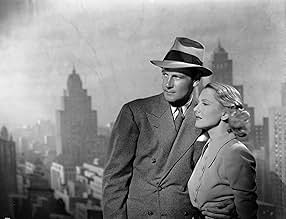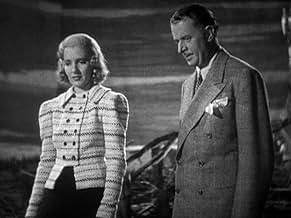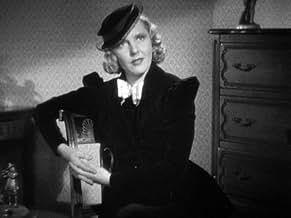Agrega una trama en tu idiomaA reporter meets an actress whose producer is a presumed-dead thief, and stakes his reputation on predicting the next crime.A reporter meets an actress whose producer is a presumed-dead thief, and stakes his reputation on predicting the next crime.A reporter meets an actress whose producer is a presumed-dead thief, and stakes his reputation on predicting the next crime.
- Dirección
- Guionistas
- Elenco
Emmett Vogan
- Lorimer
- (as Emmet Vogan)
Louise Bates
- Woman Outside Crime Scene
- (sin créditos)
William 'Billy' Benedict
- Office Boy
- (sin créditos)
Mary Blake
- Undetermined Role
- (sin créditos)
Wade Boteler
- Police Sergeant
- (sin créditos)
Romaine Callender
- Old Taxi Driver
- (sin créditos)
Wallis Clark
- City Editor
- (sin créditos)
Dora Clement
- Nurse Katie - Actress in Play
- (sin créditos)
Clyde Courtright
- Doorman at Beauty Parlor
- (sin créditos)
Opiniones destacadas
After a big success in Mr. Deeds Goes to Town which really established Jean Arthur as the rival in screwball comedy to Carole Lombard, she got cast in some routine films that sought to take advantage of her new image. Adventure in Manhattan was one of them and while it's plot verges on the silly it could have been a lot better, but for some really bad miscasting.
The guy who could have brought off the role of the wise cracking crime reporter was over at Warner Brothers. This part James Cagney could have phoned over to Columbia, but in the hands of all American hero Joel McCrea it really looks forced.
Some high profile robberies have taken place and crime reporter McCrea thinks and has written that the culprit of all these has been a master criminal along the lines of Professor Moriarty. Problem is that this guy is believed dead by all, but McCrea.
McCrea is right and it's revealed early enough in the film to be Reginald Owen who is now in the guise of a theatrical producer. And Jean Arthur is an aspiring young ingénue in the cast of a World War I play he's producing.
One of the problems I had with this plot was that Professor Moriarty and many of the master criminals in real life and fiction usually work alone or with as few accomplices as possible. The scheme that Owen has involves a considerable gang and I really can't swallow that somewhere along the line somebody doesn't slip up.
Thomas Mitchell in one of his earliest screen roles is McCrea's editor and he's his usual good self. Arthur makes the best of a routine assignment and it took someone like Preston Sturges to bring out the real comedian in Joel McCrea.
The guy who could have brought off the role of the wise cracking crime reporter was over at Warner Brothers. This part James Cagney could have phoned over to Columbia, but in the hands of all American hero Joel McCrea it really looks forced.
Some high profile robberies have taken place and crime reporter McCrea thinks and has written that the culprit of all these has been a master criminal along the lines of Professor Moriarty. Problem is that this guy is believed dead by all, but McCrea.
McCrea is right and it's revealed early enough in the film to be Reginald Owen who is now in the guise of a theatrical producer. And Jean Arthur is an aspiring young ingénue in the cast of a World War I play he's producing.
One of the problems I had with this plot was that Professor Moriarty and many of the master criminals in real life and fiction usually work alone or with as few accomplices as possible. The scheme that Owen has involves a considerable gang and I really can't swallow that somewhere along the line somebody doesn't slip up.
Thomas Mitchell in one of his earliest screen roles is McCrea's editor and he's his usual good self. Arthur makes the best of a routine assignment and it took someone like Preston Sturges to bring out the real comedian in Joel McCrea.
This is one film I was very glad I watched without reading any of the IMDb reviews beforehand. It caught me off guard, and I enjoy such mysteries that much more. All I can say from the several reviews posted before mine is that I think they were mostly fooled as well; or they knew the outcome beforehand, which must take away much of the enjoyment of this film; or they were expecting an all-out comedy romp and were disappointed that it wasn't that. I watched "Adventure in Manhattan" without any foreknowledge, except that it was a combination comedy, mystery, crime and romance. And I enjoyed it immensely. The plot is so cleverly twisted that I had to watch it again right away to see if I could find any clues I might have missed that would tip me off about what was really going on – behind the scenes, so to speak, as well as what was on screen.
The plot for "Adventure in Manhattan" is quite sophisticated. It has twists that one doesn't realize until we're past them. First, it's one thing, and then it's another. The plot has near equal doses of comedy, mystery, drama, crime and romance neatly spread throughout and interspersed. It also qualifies as a common satire in films of the period – it's another of many films about newspapers and reporters, and it lampoons the yellow journalism of the day.
The comedy isn't in the form of witty and funny dialog, but in situations. In one scene, Joel McCrea flips a coin with Jean Arthur to see where they will go to lunch. The coin lands in an alms cup of a blind man sitting on the sidewalk. As the couple lean forward and strain to try to see if it came up heads of tails, a policeman walks up and glares at them as though they're about to steal from the poor. The blind man has a big grin on his face as the couple walks off. In another scene, Thomas Mitchell rattles off directions about his newspaper to McCrea. "The columns of this paper are wide open to any young fool who can make an ass of himself entertainingly." McCrea says, "Thank you." Mitchell continues, "Now all I want is circulation. If you can write a woman in this, and a haunted castle "
The cast is superb. Jean Arthur is excellent as Claire Peyton. Joel McCrea is George Melville, a criminologist who has written books and is known as an independent columnist. Thomas Mitchell plays Phil Bane, the managing editor of a paper that wants to hire Melville to cover the heist of a famous ruby. Reginald Owen plays Blackton Gregory, a wealthy backer who is producing a play about World War I that will be opening soon. He's also a connoisseur of fine art. Peyton is the female star of the play.
McCrea's Melville is much more than a reporter, and he befuddles other reporters with his predictions about further thefts about to be committed. If one remembers that he's a criminologist, his guesses don't seem so outlandish as they do to the rest of the press pool. Suffice it to say that they don't have a clue about criminology. And this is somewhat lost on we viewers because of the guffaws that the press corps have with Melville's self-assurance. McCrea plays the character as arrogant and a braggart, yet able to put down his fellow reporters with some humor and not in a mean-spirited way.
Arthur and McCrea are the clear co-stars of this wonderfully entertaining film. But Mitchell and Owen add a great deal to make it the nice piece of entertainment that it is. If you're fortunate enough to watch it without reading a synopsis that gives away the details of the plot, you should enjoy it immensely. But, if you know its outcome beforehand, watch the way the plot unfolds and twists for the little surprise subplots. There's much more to this film than meets the eye in a first casual viewing. The more one can see the twists developing, the more fun it is.
This is one of the only movies I can recall that showed a press club for reporters and writers.
This isn't a great comedy; but it comes close to being a great mystery. With the comedy and some other drama and romantic bits, it's a very good movie that most people should enjoy.
The plot for "Adventure in Manhattan" is quite sophisticated. It has twists that one doesn't realize until we're past them. First, it's one thing, and then it's another. The plot has near equal doses of comedy, mystery, drama, crime and romance neatly spread throughout and interspersed. It also qualifies as a common satire in films of the period – it's another of many films about newspapers and reporters, and it lampoons the yellow journalism of the day.
The comedy isn't in the form of witty and funny dialog, but in situations. In one scene, Joel McCrea flips a coin with Jean Arthur to see where they will go to lunch. The coin lands in an alms cup of a blind man sitting on the sidewalk. As the couple lean forward and strain to try to see if it came up heads of tails, a policeman walks up and glares at them as though they're about to steal from the poor. The blind man has a big grin on his face as the couple walks off. In another scene, Thomas Mitchell rattles off directions about his newspaper to McCrea. "The columns of this paper are wide open to any young fool who can make an ass of himself entertainingly." McCrea says, "Thank you." Mitchell continues, "Now all I want is circulation. If you can write a woman in this, and a haunted castle "
The cast is superb. Jean Arthur is excellent as Claire Peyton. Joel McCrea is George Melville, a criminologist who has written books and is known as an independent columnist. Thomas Mitchell plays Phil Bane, the managing editor of a paper that wants to hire Melville to cover the heist of a famous ruby. Reginald Owen plays Blackton Gregory, a wealthy backer who is producing a play about World War I that will be opening soon. He's also a connoisseur of fine art. Peyton is the female star of the play.
McCrea's Melville is much more than a reporter, and he befuddles other reporters with his predictions about further thefts about to be committed. If one remembers that he's a criminologist, his guesses don't seem so outlandish as they do to the rest of the press pool. Suffice it to say that they don't have a clue about criminology. And this is somewhat lost on we viewers because of the guffaws that the press corps have with Melville's self-assurance. McCrea plays the character as arrogant and a braggart, yet able to put down his fellow reporters with some humor and not in a mean-spirited way.
Arthur and McCrea are the clear co-stars of this wonderfully entertaining film. But Mitchell and Owen add a great deal to make it the nice piece of entertainment that it is. If you're fortunate enough to watch it without reading a synopsis that gives away the details of the plot, you should enjoy it immensely. But, if you know its outcome beforehand, watch the way the plot unfolds and twists for the little surprise subplots. There's much more to this film than meets the eye in a first casual viewing. The more one can see the twists developing, the more fun it is.
This is one of the only movies I can recall that showed a press club for reporters and writers.
This isn't a great comedy; but it comes close to being a great mystery. With the comedy and some other drama and romantic bits, it's a very good movie that most people should enjoy.
An overly confident crime reporter (JOEL McCREA) and a clever actress (JEAN ARTHUR) must match wits against an even more clever art thief (REGINALD OWEN) who poses as a theatrical producer to cover his real proclivities as a thief. His theater is staging a play with heavy military artillery to disguise the noise of his thieves blasting a tunnel into the bank.
Some crisp dialog and some nice performances aren't enough to conceal that this is pretty flimsy material. Still, it does manage to show that both McCrea and Arthur had a natural flair for light material tinged with a hint of mystery.
Unfortunately, the script involving stolen art work and the attempted theft of the Sunburst Diamond from a bank vault, doesn't permit either one to create more than one-dimensional characters and after an original start, the story runs out of wacky ideas and turns serious before it reverts to comedy again.
McCrea and Arthur play their roles as though they were imitating the Nick and Nora Charles brand of humor in comedy with mystery. With stronger material, this would have worked. THOMAS MITCHELL is good as a newspaper man who fires and hires McCrea in moments of great exasperation.
It's light stuff and highly forgettable except for the charm of the two stars.
Some crisp dialog and some nice performances aren't enough to conceal that this is pretty flimsy material. Still, it does manage to show that both McCrea and Arthur had a natural flair for light material tinged with a hint of mystery.
Unfortunately, the script involving stolen art work and the attempted theft of the Sunburst Diamond from a bank vault, doesn't permit either one to create more than one-dimensional characters and after an original start, the story runs out of wacky ideas and turns serious before it reverts to comedy again.
McCrea and Arthur play their roles as though they were imitating the Nick and Nora Charles brand of humor in comedy with mystery. With stronger material, this would have worked. THOMAS MITCHELL is good as a newspaper man who fires and hires McCrea in moments of great exasperation.
It's light stuff and highly forgettable except for the charm of the two stars.
I have long admired Jean Arthur, so when I came across one of her films I did not know I naturally jumped at the chance to watch it. I did not even bother to read any of the reviews here or elsewhere in advance. As it turns out, that was probably the right decision: Some of these reviews might have prejudiced me against this near-perfect 1930s comedy. The plot is too convoluted to summarise here, but director Edward Ludwig manages to present it in a way that makes every twist and turn, however zany, look plausible (at least for the moment). He also gives 'Adventure in Manhattan' great tempo and pace: there is never a dull moment, and many moments that are simply hilarious. Joel McCrea plays a criminologist with a Sherlock Holmes-like ability to put himself in a master-thief's position and to second-guess the thief's plans. As his predictions come true he is so full of himself that one failure is truly devastating. Jean Arthur is great as an actress who thinks he is nuisance but eventually falls in love with him. The dialogues are spot on: sharp and witty. In sum, this is as nice a comedy as you will find: don't believe the reviewers who jumped on the bandwagon talking it down!
Joel McCrea gets robbed of his wallet by some weird blonde, who proves to be mixed up with the theatre business, while he is a controversial journalist who is famous for presenting predictions that come true. It's a screwball comedy with straight and witty dialog all the way getting smarter all the time, as the plot gradually thickens, and a great bank robbery is synchronized with a great premiere of a first world war drama with reckless gunfire, bombs, explosions and plenty of smoke, and for some reason Jean Arthur gets the hang of it. She is brilliant, and so is Joel McCrea, they work splendidly together as an odd couple in constant arguments with each other about their incurable differtences, but it's a comedy - nothing to worry about.
¿Sabías que…?
- TriviaOn the map of Manhattan that George is doodling on, what is now Roosevelt Island (in the East River) is labeled Welfare Island. It was named that from 1921 to 1973, for the several hospitals there. It was renamed Roosevelt Island in 1973, in honor of FDR.
- ErroresWhile playing pool the level of Joel McCrea's beer goes from half-full to almost full.
- Citas
Claire Peyton: [looks around the room] My, how the Ritz has shrunk.
- ConexionesFeatured in One Rogue Reporter (2014)
- Bandas sonorasIt's a Long, Long Way to Tipperary
(1912) (uncredited)
Written by Jack Judge and Harry Williams
Sung a cappella by soldiers in the play
Selecciones populares
Inicia sesión para calificar y agrega a la lista de videos para obtener recomendaciones personalizadas
Detalles
- Tiempo de ejecución1 hora 13 minutos
- Color
- Relación de aspecto
- 1.37 : 1
Contribuir a esta página
Sugiere una edición o agrega el contenido que falta




































